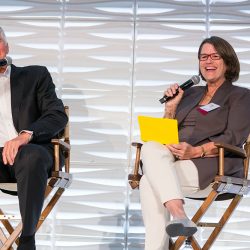Battling Pancreatic Cancer
The Oglesby family brings hope to others touched by the disease.

Mike Oglesby and daughter Shannon: The family rallied around Mike when he was diagnosed with stage four metastatic pancreatic cancer. Courtesy of the Oglesby family
Michael Oglesby was a devoted family man and a passionate engineer, one of seven children who grew up in Dubuque, Iowa. His parents, Harry and Ann, came of age during World War II and understood what it was to be in need. So they chose to impart to their children the importance of giving back.
The Oglesbys immediately rallied when Mike was diagnosed with stage four metastatic pancreatic cancer. He got the news in 2015, just two weeks after his daughter’s wedding, and despite treatment, he only survived another 60 days, passing away at age 52. “As an engineer,” says Diane Oglesby, one of Mike’s younger sisters, “Mike was always wanting to figure things out, and he wanted to understand why he’d developed terminal cancer.”
Mike’s curiosity inspired his siblings to channel their grief into raising awareness and funds for research. Within a matter of weeks after his passing, the family had organized the Faj Squad 5K — a fundraiser named after the nickname given to Mike by his daughters. The event brings in 300 to 350 participants and is growing every year. In 2016, they launched the Michael W. Oglesby Foundation, followed by the Michael W. Oglesby Pancreas Cancer Research Fund.
“We knew that the funds we raised could really help, and UW Health had the perfect pancreatic cancer research center,” says Diane.
There’s a critical need for more research on early detection of pancreatic cancer. It’s the third-leading cause of cancer-related deaths in the nation — more than 70 percent die in the first year, and more than 90 percent of patients die within five years of diagnosis. The Michael W. Oglesby Foundation is working to bring hope through supporting screening studies, earlier detection, better treatments, and ultimately, a cure.
The family is thrilled that the research fund is already helping Sean Ronnekleiv-Kelly, an assistant professor in the surgical oncology division at the UW School of Medicine and Public Health. His clinical focus is pancreatic cancer, and in his lab, he studies mice to explore how circadian disruptions affect pancreatic cancer progression.
“It’s soul-crushing to tell someone who has gone through treatment that their prognosis isn’t good,” says Ronnekleiv-Kelly. “We have to do better for people like Mike. I am extremely grateful to the Oglesby family and the Faj Squad for their generous support and for their passion to help combat this devastating disease.”
Published in the Fall 2023 issue



Comments
No comments posted yet.